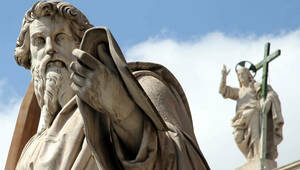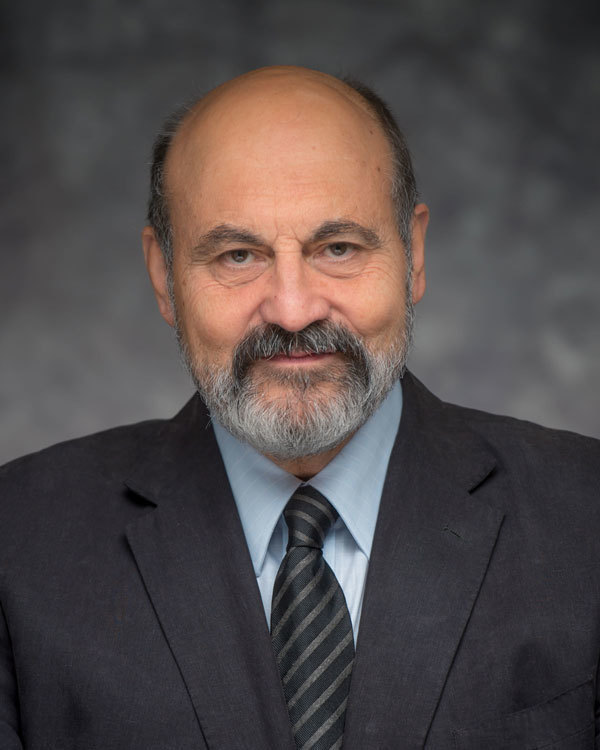Msgr. Tomáš Halík, "How to Respond to the Signs of the Times?"

9:00 am — Theology for a Postsecular Age: Trends in Contemporary Theology in North and South America
10:30 am — Spirituality for a Postsecular Age
1:15 pm — Spirituality and Theology in Discerning the "Signs of the Time"
2:45 pm — Christian Identity in a Multicultural World
4:00 pm — Concluding Remarks

Msgr. Professor Tomáš Halík is Professor of Philosophy at the Institute of Philosophy and Religious Studies at Charles University in Prague. He specializes in philosophy of religion and sociology of religion, interreligious dialogue and dialogue between believers and nonbelievers.
Professor Halík is the author of numerous works in which his focus is the spiritual diagnosis of our times and the dialogue between faith and atheism, including Patience with God (2010), Night of the Confessor (2012) and I Want You to Be (2016). His books have been published in up to 18 languages and have received international recognition and awards. Patience with God (2010) received the prize for the best European Theological Book for 2009-2010 by the decision of European Society for Catholic Theology, and in the United States of America it was named book of the month in July 2010.
He has been a visiting professor at universities including Oxford and Cambridge, and he has lectured at a number of universities and international scholarly conferences in Europe, the United States of America, Asia, Australia, Canada, Latin America, and Southern Africa. He read annual lectures at Harvard University, at Cambridge University, at Calvin College, at Catholic University Leuven, etc. In 1998, Professor Halík was appointed a member of the European Academy of Sciences and Arts. He also currently serves as president of the Christian Academy (since 1990) and vice-president of Council for Research in Values and Philosophy in Washington (2015). In 1992, Pope John Paul II appointed him advisor to the Pontifical Council for Dialogue with Non-Believers and in 2009, Pope Benedict XVI granted him the title of Monsignor – Honorary Prelate of His Holiness.
Professor Halík has received several international prizes, including the Cardinal Koenig Prize (2003) and the Romano Guardini Prize (2010), the honorary title Man of Reconciliation 2010 for his contribution to dialogue between Christian and Jews, the Medal for intercultural and religious dialogue from the Islamic Fund, and the Knight’s Cross of the Order of Merit of the Republic of Poland (2012). In 2014 he was awarded the Templeton Prize. He received an honorary doctorate in Divinity from Erfurt University (2014) and from Oxford University (2016). In the fall of 2015, he served as a Templeton Fellow in residence at the Notre Dame Institute for Advanced Study (NDIAS).
Third Symposium Schedule
8:00 am — Continental Breakfast and Gathering
9:00 am — Session 1: Theology for a Postsecular Age: Trends in Contemporary Theology in North and South America
Interesting new trends and developments have emerged in European postmodern theology and philosophy of religion. These trends may be understood as the result of a so-called “religious turn in phenomenology,” occurring in France and a number of other western European nations. In this session, participants are invited to consider questions about the capability of theology and theologians for encountering the postsecular age.
Principal Questions to Consider:
- Does contemporary theology, as found in both North and South America, respond to the “signs of the time”? If so, what has been its most significant or effective results in both geographical settings? What are the respective paths forward?
- How well prepared is American (North and South America) theology for encountering contemporary society and culture?
- Are American theologians, especially in Latin American, prepared to engage in a necessary dialogue with contemporary culture and society? If not, what is lacking in the preparation and training of these theologians? What must change and how do Church foundations and teachings direct, inform, and give substance to this effort?
10:15 am — Break
10:30 am — Session 2: Spirituality for a Postsecular Age
Our current age has witnessed a remarkable and growing global interest in spirituality, perhaps in and of itself a modern day “sign of the times.” Theologians and sociologists studying this trend have begun to assess the meaning of this trend, with some contemporary sociologists distinguishing it as a shift from religion to spirituality. In this session, participants are invited to consider the distinctive nature of spirituality (as it differs from theology), the strengths and weaknesses of each in the postsecular age, and how spirituality, especially in light of its recent re-emergence in many Western societies, may offer new opportunities for the Church.
Principal Questions to Consider:
- What trends have emerged in postmodern spirituality?
- What are the contemporary trends in Catholic spirituality and how do we assess their impact on a postmodern culture? Which of these offers the greatest opportunities for a significant development of faith and action?
- Is the interest in spirituality a reaction to secularity or the effect of secularity?
- How might spirituality, as set apart from theology, be useful or even desirable in fostering interreligious dialogue?
- What is and what should be the pastoral and theological response of the Church to postmodern culture?
- Is the interest in eastern spirituality and “multiple religious belonging” a challenge for Christianity?
- What does the study of mysticism offer a present-day Church and its encountering of the postmodern world?
- Could we see a renewal of Christianity emerging from the resources of spirituality (as distinctive from theology)?
11:45 am — Lunch break
1:15 pm — Session 3: Spirituality and Theology in Discerning the “Signs of the Time”
Well-known theologian Hans Urs von Balthasar observed that the greatest crisis in the history of Christianity was the division between spirituality and academic theology. In this session, participants are invited to consider the veracity of this observation and, if true, how best to repair this division, as well as the insights and benefits from Ignatian spirituality to aiding the present-day Church in discerning the “signs of the times.”
Principal Questions to Consider:
- Is it reasonable to expect a new synthesis of spirituality and theology in the present age? Are these components of faith and Christian belief reconcilable or have institutional and individual interests divided them permanently?
- “Discerning of spirits” is an essential part of Ignatian spirituality. What does this critical component in Catholic theology, spirituality, and formation offer the present-day Church in terms of its insights into discerning the “signs of the times”?
- Is Ignatian spirituality useful in identifying a proper spiritual “diagnosis” of our time? How could the present-day Church apply this method as a means for powerful and effective discernment of “the signs of the time”?
2:30 pm — Break
2:45 pm — Session 4: Christian Identity in a Multicultural World
This session will focus on how the idea and process of globalization are transforming the worldwide understanding and context of religion. Of particular interest and discussion will be new challenges currently being confronted by Christianity as well as new challenges just beginning to emerge.
Principal Questions to Consider:
- How extensive can present-day Christians engage in interreligious cooperation without losing the core beliefs and substance of their faith?
- How can the Church maintain its identity, in particular its core beliefs, practices, and institutions, in an age of radical plurality?
- What lessons does the past experiences of the Church provide in considering these questions?
- Do modern academic understandings of the world, especially those that have been drawn from social science research, provide the Church with instructive and insightful ideas on interreligious dialogue, cooperation, and maintaining a Church that is both catholic and Catholic?
- What does the multicultural world teach the Church about discernment, encountering the postmodern world, and retaining a distinctive identity?
4:00 pm — General Concluding Discussion
4:30 pm — Formal Dismissal